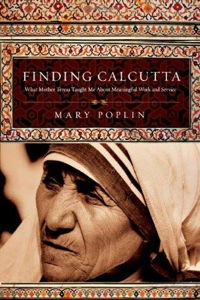
How can the work of Mother Teresa and her community speak to the University world? Explore Mother Teresa’s vocation and discern your own. We offer here the questions that guided our online book club on Mary Poplin's Finding Calcutta: What Mother Teresa Taught Me About Meaningful Work and Service.
Dr. Mary Poplin is Professor of Education at Claremont Graduate University. She has served there both as Director of the Teacher Education Program and as the Dean of the School of Educational Studies. She has worked with Mother Teresa and the Missionaries of Charity in Calcutta and spoken at Veritas Forums across the country. She has also been featured in Christianity Today.
Interested in hearing from the author herself? Listen to our bookclub conversation with Dr. Mary Poplin through our podcast.
Theme 1: Understanding Vocation from Mother Teresa’s life
1. Here are some ways of describing Mother Teresa’s practice of her vocation among the poor in Calcutta:
- incarnational
- obedient to a community order
- demonstrating servant leadership
- seeing prayer as the first work
- showing individuals they matter
- embracing an authentic or indigenous approach
- (can you think of others?)
In light of this list, what are some elements of Mother Teresa’s mindset, attitude, and practices that particularly speak to you? How can we observe Mother Teresa’s approach in her context and adapt it to our own particular work and life contexts?
2. Are there observations Mother Teresa made that resonated with or disturbed you?
3. Does a book like this — about an exemplary figure whose whole life was given over to a single calling — add an extra burden to those of us women who juggle multiple callings at work, home, and elsewhere? Do multiple callings make it harder for others to see us as leaders?
Theme 2: Discerning our own vocations, purpose, and place from Mary Poplin’s insights
1. Mary Poplin asks, “Does my research and teaching about the poor ever help the poor?”
- Does yours? Tell us more about why or why not.
- Who does your work or research benefit?
2. Mary Poplin suggests that our “crises and grievings” might reveal our true call. She also suggests that answering our call is not always exhilarating. This was true for Biblical figures like Joseph and Daniel who were shaped by suffering.
- What has been your own process of finding your Calcutta?
- If you are struggling to figure out your Calcutta, what resources might you need to clarify your sense of calling?
3. Mary Poplin critiques her own discipline (page 152). Here’s how we can make her questions our own.
- What are the foundational principles of what you are learning or teaching?
- Which of these foundational assumptions are true and which are false?
- Are there any true principles that are absent?
4. What are the biases in higher education? What is privileged and what is ignored or despised?
We'd love to hear more about your book club!
Let us know if you are using this guide — we'd love to pray for your meetings!